 Technology peripherals
Technology peripherals
 AI
AI
 'Painted Skin' nightmare come true? This robot wearing 'human skin' appeared in the Cell sub-magazine
'Painted Skin' nightmare come true? This robot wearing 'human skin' appeared in the Cell sub-magazine
'Painted Skin' nightmare come true? This robot wearing 'human skin' appeared in the Cell sub-magazine
Imagine a finger gently and slowly tracing across your back, traveling up your spine, and then slowly stopping...
You feel a little itchy , but at this time you have not fully woken up from your sleep.
You half-opened your eyes sleepily, feeling the slightest chill coming from your back.

Just when you turn around to see who is next to you early in the morning....
『***!』
You screamed and rolled out of bed, and you suddenly found that the person sleeping with you was a robot!
You were suspicious, wondering how this robot could touch you like a human.
You take a closer look and find that this robot is actually wrapped in a layer of human skin...
Wait a minute, what is this...
Speaking of human skin, how much? All have something to do with horror.
The only word that comes to my mind that starts with human skin is the story of "human skin" in the novel Ten Deadly Sins.
I remember that when I first watched it, I was in junior high school, so it was a shadow of my childhood.
So, when I heard about human skin fingers, I couldn't help but tremble in my heart.

# Recently, in Cell’s sub-magazine Matter, a group of Japanese scientists showed off a robot finger covered with “skin”. It is said that this "skin" feels very much like human skin.
Professor Takeuchi modestly said that the skin is not yet complete because it lacks features such as neurons, hair follicles, nails and sweat glands.
But in terms of texture, it is more than a star and a half better than silicone!
In addition, this "skin" has two very important features: it can heal itself and it can be waterproof.
This means that the "skin" attached to the robot can repair its own wounds and abrasions, just like normal human skin.

Paper link: https://www.cell.com/matter/pdfExtended/S2590-2385(22)00239-9
Now, it’s time to satisfy your curiosity.
What was your first reaction when you saw the picture below?
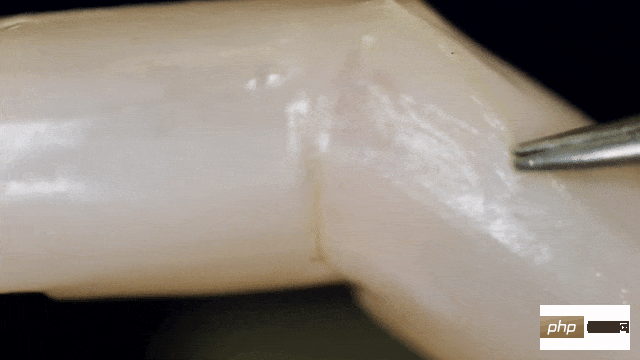
Now, imagine that this finger is your own, and the scientist is carefully using tweezers to lift the surface of the skin a little...
If you find it scary, it means that this thing really reminds you of human fingers.
Look carefully, the part picked up by the tweezers looks very elastic and crystal clear, a bit like the skin of shrimp dumplings.
As for the practical part, first of all, it is definitely not possible to peel off human skin and tie it to metal. That would be a pure horror story.
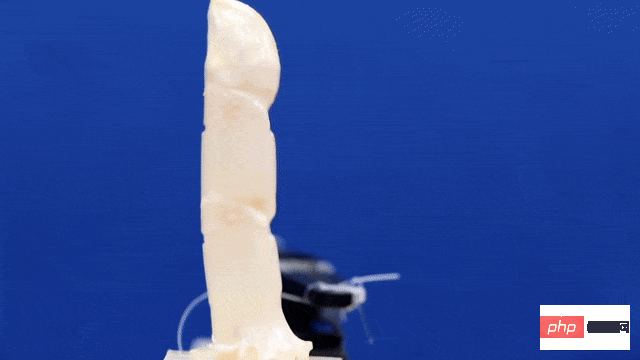
Do you still remember what I just said, the texture is close to human skin?
Now let me reveal the reason:
Because it is made from real, living human skin cells.
Speaking of which, does the Japanese team really not consider using it in "pillar industries"?
Robots covered in "human skin"
In order to develop human-like skin, Professor Takeuchi and his team used two key elements that make up the human dermis. Section: Collagen and dermal fibroblasts.
Among them, collagen is a protein that gives the skin its structure and elasticity, while dermal fibroblasts play a role in wound repair.
When the team immersed the robotic finger in a solution containing these two ingredients, the mixture of collagen and fibroblasts shrank around the mechanical finger and wrapped it tightly, forming the first layer of skin.
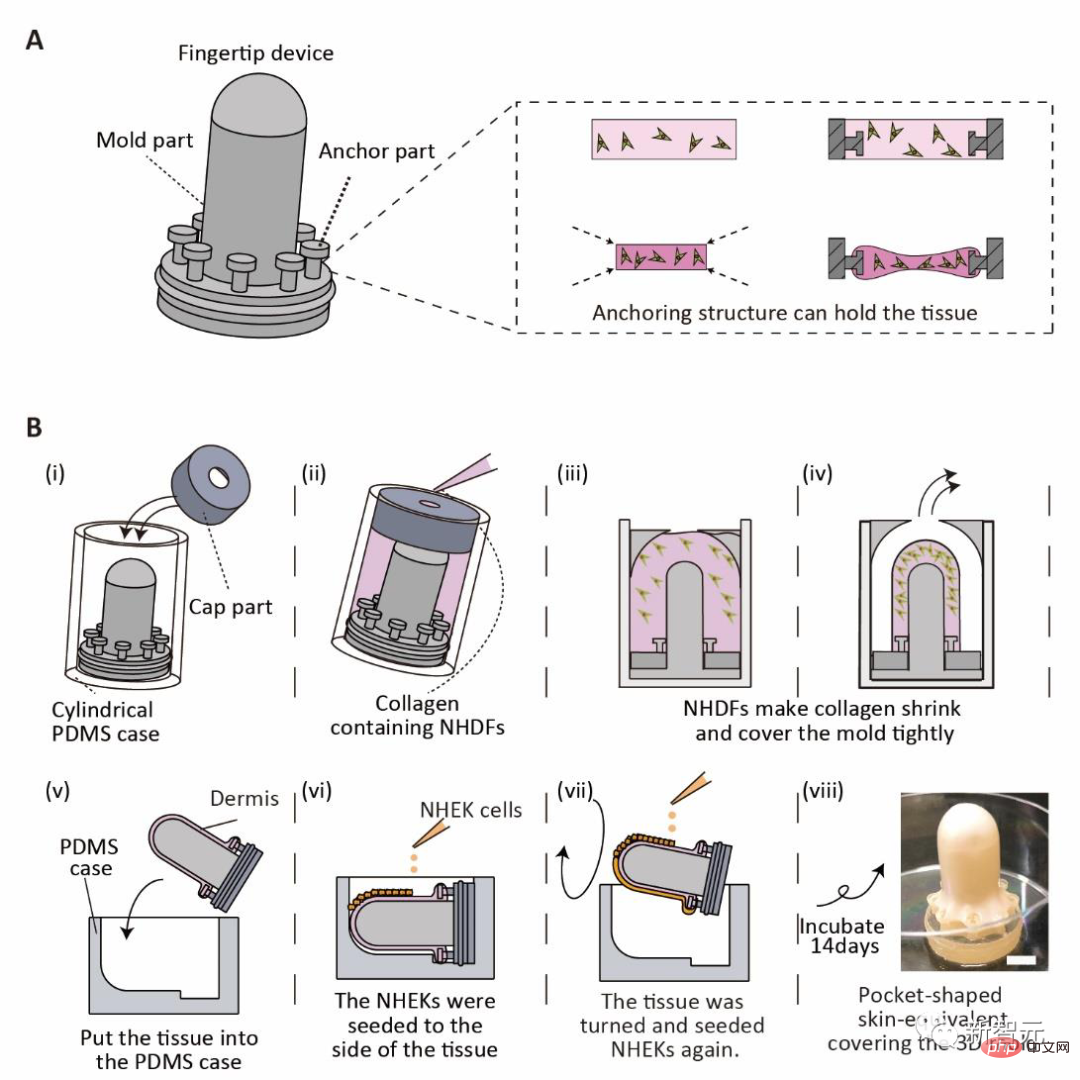
#When making the second layer of skin, researchers replaced fibroblasts with keratinocytes, which are the main cellular components of the epidermis. , accounting for 90% of human epidermal cells. Later, keratinocytes gradually adhere to the underlying layer of fibroblasts.
At this point, the skin of the mechanical finger is ready.
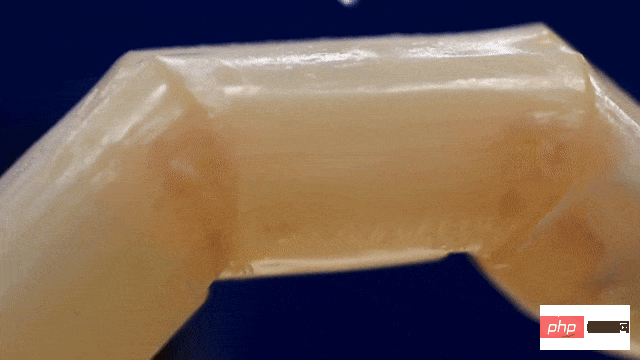
In the next test, the researchers found that the artificial "skin" has very good elasticity and can follow the movement of the robot's fingers. Rather stretch and wrinkle.
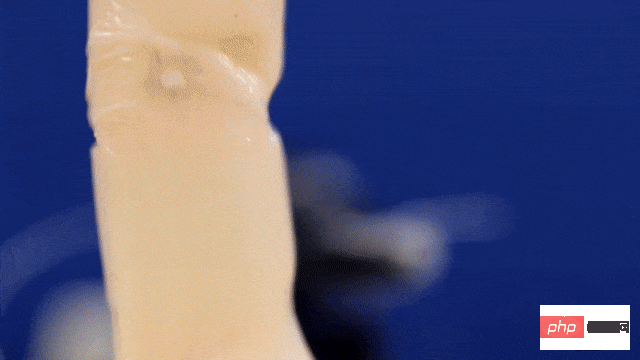
Going a step further, the researchers tested the degree of water rejection of the "skin."
The method is also very simple, just put a polystyrene foam bead in front of your finger and see if it can bounce it away.
Although it is just an inconspicuous bead, it is a very difficult challenge for moist epidermis.
Because generally speaking, polystyrene beads will stick to the surface of the robot easily.
But in this case, fingers successfully flicked the bead away, confirming that its skin repels water just like our own.
In contrast, although the instrument finger covered with another kind of skin tried its best, the nasty bead finally got stuck on the finger tip after several attempts to flick it. .
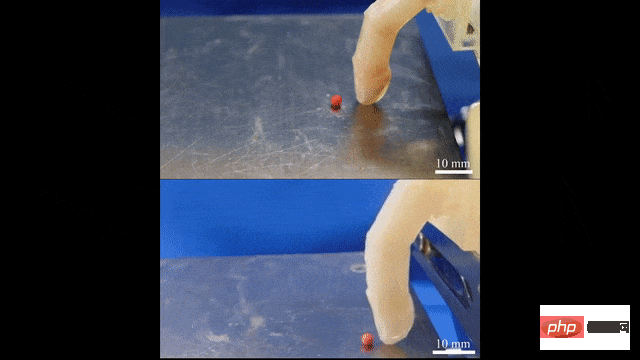
The final test is to find out whether the skin can heal itself.
The researchers first used a scalpel to cut a small incision in the middle joint of the robot, and then bandaged it with a collagen dressing, which is a common method for treating real wounds.
After a week in a petri dish, the collagen bandage had transformed into skin and remained in place after several joint movements.
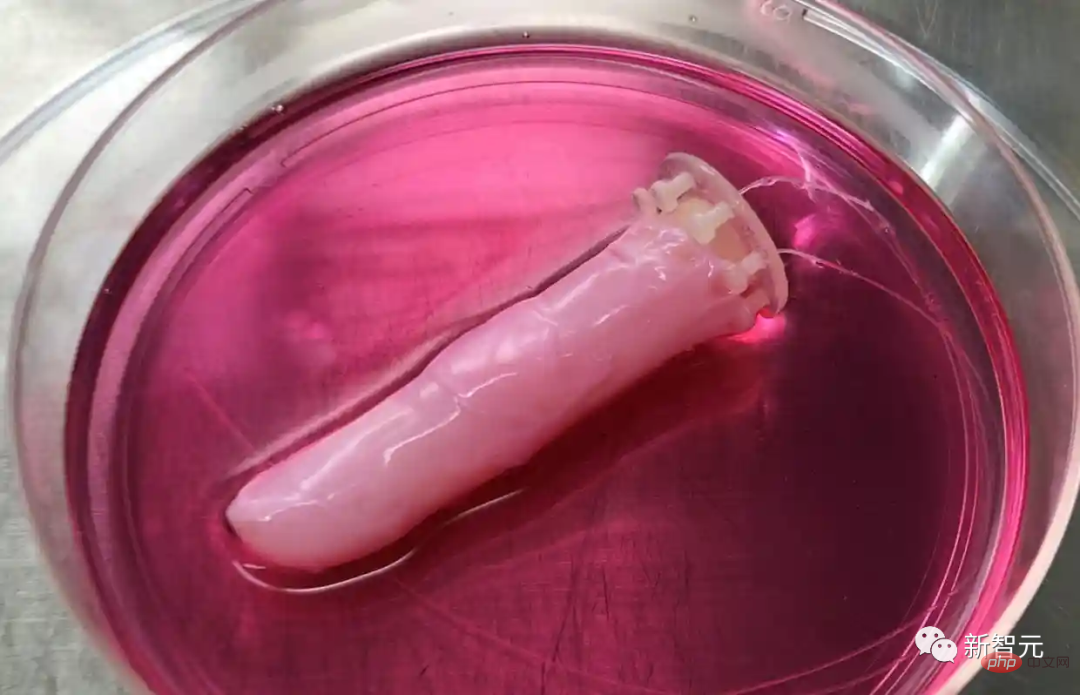
After a set of operations, even Professor Takeuchi praised: "We were shocked by the fit between the skin tissue and the surface of the robot."
Robot simulation? Very important
Having said that, why do these Japanese scientists wrap the fingers of the robot with human skin?
Is it really... idle?
In fact, it is very important for robotics experts to make robots more and more like humans. It can even be said to be one of their main goals.
Nicole Robinson, a human-computer interaction expert at Monash University, said that giving robots human characteristics not only makes them look more related to people in appearance, but also improves the safety factor of robots completing tasks. and efficiency.
"It is very important for robots to effectively interact with the human world."
For example, a robot with a human-like hand is performing grabbing Will do better when doing tasks.
The truth is actually very simple. Grasping itself is something that humans do, and of course the more it resembles a human hand, the better.
Another reason is that making robots more human-like will make the real people working with these robots safer.
Professor Robinson said, "In this way, the robot will not cause much harm if it accidentally touches a person."
In addition, the most exciting part of "human skin" is in fields other than robots. Potential applications include designing lifelike prosthetics or treating burn patients.
It is for all the above reasons that robotics experts have been working tirelessly towards humanoid robots.
Look at this robot, Ameca, developed by Engineered Arts last year.
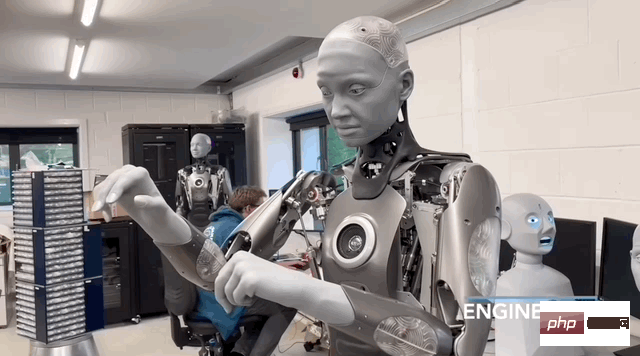
In fact, whether it is expression, touch, or whatever, it is all the efforts of scientists.
But for roboticists, creating realistic "skin" for robots is a huge challenge.
While soft materials like silicone are strong and flexible enough to adapt to the robot's movements, there is no way for them to repair themselves if they are accidentally torn.
Also, getting a flat piece of silicone to fit like a glove onto the robot’s jagged body was a challenge.
Professor Takeuchi also added, "Silicone skin doesn't look that real either. The silicone covers we commonly use today may look real from a distance, or in photos or videos. But when you actually go So close, you can tell at a glance that it is artificial."
Takeuchi joked, "It would take a tailor with great skills to do this job to trim the silicone to look like that."
So, when can we buy it?
Juxi Leitner, a robotics expert at Monash University, said that the current artificial skin does not contain all the components of human skin, such as subcutaneous tissue and blood vessels.
Therefore, these skins will not live very long without continuous access to the nutrients they need.
However, Professor Takeuchi and his team have begun to think about how to establish a "circulatory system" in robot skin in order to create robot skin with sensory neurons, hair follicles, nails and sweat glands. .
Obviously, in the short term, we don’t have to worry about trying to distinguish which is a robot and which is a human when walking on the road.
Reference:
https://www.abc.net.au/news/ science/2022-06-10/robotic-finger-wrapped-with-living-human-skin-by-scientists/101129954#:~:text=A team of researchers in,help of a collagen bandage.
https://www.cnet.com/science/biology/scientists-craft-living-skin-for-robots-made-of-human-cells/
https://www.cell.com/matter/fulltext/S2590-2385(22)00239-9?_returnURL=https://linkinghub.elsevier.com /retrieve/pii/S2590238522002399?showall=true
The above is the detailed content of 'Painted Skin' nightmare come true? This robot wearing 'human skin' appeared in the Cell sub-magazine. For more information, please follow other related articles on the PHP Chinese website!

Hot AI Tools

Undresser.AI Undress
AI-powered app for creating realistic nude photos

AI Clothes Remover
Online AI tool for removing clothes from photos.

Undress AI Tool
Undress images for free

Clothoff.io
AI clothes remover

Video Face Swap
Swap faces in any video effortlessly with our completely free AI face swap tool!

Hot Article

Hot Tools

Notepad++7.3.1
Easy-to-use and free code editor

SublimeText3 Chinese version
Chinese version, very easy to use

Zend Studio 13.0.1
Powerful PHP integrated development environment

Dreamweaver CS6
Visual web development tools

SublimeText3 Mac version
God-level code editing software (SublimeText3)

Hot Topics
 1653
1653
 14
14
 1413
1413
 52
52
 1304
1304
 25
25
 1251
1251
 29
29
 1224
1224
 24
24
 King of Glory Angela rides the dragon treasure boat skin list
Feb 07, 2024 pm 04:00 PM
King of Glory Angela rides the dragon treasure boat skin list
Feb 07, 2024 pm 04:00 PM
Overview of the skin of Angela Riding the Dragon Treasure Ship in Honor of Kings. Friends, the Angela Riding the Dragon Treasure Ship will be launched in the game soon. Many players are curious about the price and special effects of the skin of Angela Riding the Dragon Treasure Ship. Let me introduce it to you below. Overview of the skin of Angela Riding the Dragon and Treasure Ship in Honor of Kings Answer: The price is 710 coupons in the first week, and the price is 888 coupons after the first week. List of Angela's Dragon Treasure Ship skin special effects Appearance special effects: Passive special effects: Normal attack special effects: First skill special effects: Second skill special effects: Third skill special effects: Friends, as the New Year is approaching, King of Glory has also recently announced five special effects. The special effects and models of the Year of the Dragon limited edition skins. It has to be said that the quality is all S+ level, and there are even a few that can be promoted to the top 10 of the year.
 After 2 months, the humanoid robot Walker S can fold clothes
Apr 03, 2024 am 08:01 AM
After 2 months, the humanoid robot Walker S can fold clothes
Apr 03, 2024 am 08:01 AM
Editor of Machine Power Report: Wu Xin The domestic version of the humanoid robot + large model team completed the operation task of complex flexible materials such as folding clothes for the first time. With the unveiling of Figure01, which integrates OpenAI's multi-modal large model, the related progress of domestic peers has been attracting attention. Just yesterday, UBTECH, China's "number one humanoid robot stock", released the first demo of the humanoid robot WalkerS that is deeply integrated with Baidu Wenxin's large model, showing some interesting new features. Now, WalkerS, blessed by Baidu Wenxin’s large model capabilities, looks like this. Like Figure01, WalkerS does not move around, but stands behind a desk to complete a series of tasks. It can follow human commands and fold clothes
 The second generation Ameca is here! He can communicate with the audience fluently, his facial expressions are more realistic, and he can speak dozens of languages.
Mar 04, 2024 am 09:10 AM
The second generation Ameca is here! He can communicate with the audience fluently, his facial expressions are more realistic, and he can speak dozens of languages.
Mar 04, 2024 am 09:10 AM
The humanoid robot Ameca has been upgraded to the second generation! Recently, at the World Mobile Communications Conference MWC2024, the world's most advanced robot Ameca appeared again. Around the venue, Ameca attracted a large number of spectators. With the blessing of GPT-4, Ameca can respond to various problems in real time. "Let's have a dance." When asked if she had emotions, Ameca responded with a series of facial expressions that looked very lifelike. Just a few days ago, EngineeredArts, the British robotics company behind Ameca, just demonstrated the team’s latest development results. In the video, the robot Ameca has visual capabilities and can see and describe the entire room and specific objects. The most amazing thing is that she can also
 How can AI make robots more autonomous and adaptable?
Jun 03, 2024 pm 07:18 PM
How can AI make robots more autonomous and adaptable?
Jun 03, 2024 pm 07:18 PM
In the field of industrial automation technology, there are two recent hot spots that are difficult to ignore: artificial intelligence (AI) and Nvidia. Don’t change the meaning of the original content, fine-tune the content, rewrite the content, don’t continue: “Not only that, the two are closely related, because Nvidia is expanding beyond just its original graphics processing units (GPUs). The technology extends to the field of digital twins and is closely connected to emerging AI technologies. "Recently, NVIDIA has reached cooperation with many industrial companies, including leading industrial automation companies such as Aveva, Rockwell Automation, Siemens and Schneider Electric, as well as Teradyne Robotics and its MiR and Universal Robots companies. Recently,Nvidiahascoll
 The first robot to autonomously complete human tasks appears, with five fingers that are flexible and fast, and large models support virtual space training
Mar 11, 2024 pm 12:10 PM
The first robot to autonomously complete human tasks appears, with five fingers that are flexible and fast, and large models support virtual space training
Mar 11, 2024 pm 12:10 PM
This week, FigureAI, a robotics company invested by OpenAI, Microsoft, Bezos, and Nvidia, announced that it has received nearly $700 million in financing and plans to develop a humanoid robot that can walk independently within the next year. And Tesla’s Optimus Prime has repeatedly received good news. No one doubts that this year will be the year when humanoid robots explode. SanctuaryAI, a Canadian-based robotics company, recently released a new humanoid robot, Phoenix. Officials claim that it can complete many tasks autonomously at the same speed as humans. Pheonix, the world's first robot that can autonomously complete tasks at human speeds, can gently grab, move and elegantly place each object to its left and right sides. It can autonomously identify objects
 The humanoid robot can do magic, let the Spring Festival Gala program team find out more
Feb 04, 2024 am 09:03 AM
The humanoid robot can do magic, let the Spring Festival Gala program team find out more
Feb 04, 2024 am 09:03 AM
In the blink of an eye, robots have learned to do magic? It was seen that it first picked up the water spoon on the table and proved to the audience that there was nothing in it... Then it put the egg-like object in its hand, then put the water spoon back on the table and started to "cast a spell"... …Just when it picked up the water spoon again, a miracle happened. The egg that was originally put in disappeared, and the thing that jumped out turned into a basketball... Let’s look at the continuous actions again: △ This animation shows a set of actions at 2x speed, and it flows smoothly. Only by watching the video repeatedly at 0.5x speed can it be understood. Finally, I discovered the clues: if my hand speed were faster, I might be able to hide it from the enemy. Some netizens lamented that the robot’s magic skills were even higher than their own: Mag was the one who performed this magic for us.
 Ten humanoid robots shaping the future
Mar 22, 2024 pm 08:51 PM
Ten humanoid robots shaping the future
Mar 22, 2024 pm 08:51 PM
The following 10 humanoid robots are shaping our future: 1. ASIMO: Developed by Honda, ASIMO is one of the most well-known humanoid robots. Standing 4 feet tall and weighing 119 pounds, ASIMO is equipped with advanced sensors and artificial intelligence capabilities that allow it to navigate complex environments and interact with humans. ASIMO's versatility makes it suitable for a variety of tasks, from assisting people with disabilities to delivering presentations at events. 2. Pepper: Created by Softbank Robotics, Pepper aims to be a social companion for humans. With its expressive face and ability to recognize emotions, Pepper can participate in conversations, help in retail settings, and even provide educational support. Pepper's
 Cloud Whale Xiaoyao 001 sweeping and mopping robot has a 'brain'! | Experience
Apr 26, 2024 pm 04:22 PM
Cloud Whale Xiaoyao 001 sweeping and mopping robot has a 'brain'! | Experience
Apr 26, 2024 pm 04:22 PM
Sweeping and mopping robots are one of the most popular smart home appliances among consumers in recent years. The convenience of operation it brings, or even the need for no operation, allows lazy people to free their hands, allowing consumers to "liberate" from daily housework and spend more time on the things they like. Improved quality of life in disguised form. Riding on this craze, almost all home appliance brands on the market are making their own sweeping and mopping robots, making the entire sweeping and mopping robot market very lively. However, the rapid expansion of the market will inevitably bring about a hidden danger: many manufacturers will use the tactics of sea of machines to quickly occupy more market share, resulting in many new products without any upgrade points. It is also said that they are "matryoshka" models. Not an exaggeration. However, not all sweeping and mopping robots are



